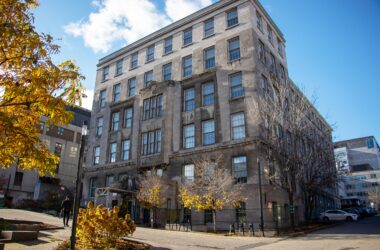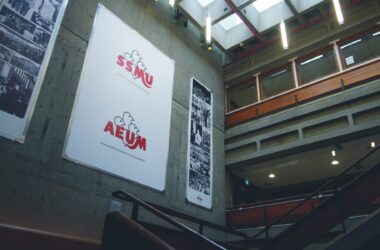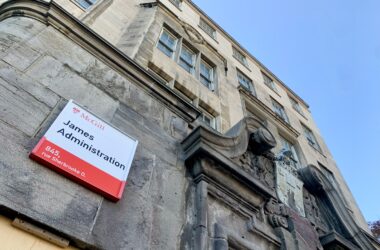Students walking through campus will once again pass Muslim students praying in stairwells and on fields as the ongoing dispute between McGill and the Muslim Student Association over providing a prayer space drags into its second year.
The dispute began in May 2005 when the university declined to renew MSA’s lease on a prayer space in the basement of Peterson Hall. Muslim students were left with no dedicated prayer space on campus, though the university maintained that any student was welcome to use empty classrooms on campus for quiet reflection or prayer. MSA executives found this solution unacceptable, and last year protested numerous times in front of the James Administration building, even holding a sit-in in the principal’s office. However, a solution has yet to be found.
Over the summer months, a multi-faith prayer area was provided by the Students’ Society in room B-29 of the Shatner building. According to MSA President Ayaz Hyder, SSMU has been more helpful than the McGill administration.
“The impression we have gotten from [SSMU] is that they are very supportive and they are trying to work with us and meet with us to resolve this issue as soon as possible. The SSMU has been very helpful,” Hyder said.
Unfortunately, according to SSMU Vice-President Clubs and Services Floh Herra-Vega, SSMU will be unable to provide a more long-term solution by reserving B-29 as a prayer space during the year.
“Over the summer, Shatner is fairly empty,” she said. “We saw an option to give them a place to pray, but during the school year Shatner is booked to the max. It’s just crazy-busy, which is why we can’t provide space otherwise.”
Herra-Vega said she would like to see a permanent solution but added that it was not SSMU’s duty to provide a prayer space.
“We firmly believe that the university should be providing prayer space for students that is adequate for all sorts of religions, which currently isn’t available,” she said. “I think that it’s a university responsibility because it’s not just students but also faculty that would use it.”
In April, the MSA filed a complaint with the Quebec Human Rights Commission, hoping for a ruling that would affirm McGill’s responsibility to provide prayer space. In March, the HRC ruled on a similar case between Muslim students at Montréal’s École de technologie supérieure and that university’s administration. That decision held that ETS had a responsibility to accommodate the religious practices of its students.
“The root of the problem is that the university has not created enough rooms for student’s needs,” Hyder said. “Concordia was just given a prayer space that was furnished with carpets and ablution facilities and creative ways to incorporate men and women to be able to pray on a daily basis,” Hyder said.
He said the university has to cater to more than academic needs. “McGill does not spend enough or give the SSMU enough to allocate to us. The needs for students are not only academic, they also have their spiritual needs.”
While there has been no interaction between the MSA and the administration over the summer, the administration has argued that because of McGill’s role as a secular institution, it should not be required to provide space dedicated to accommodate students’ religious needs.
“I agree that students have many needs besides academic needs; it’s also a fact of life that the university cannot undertake to fulfill all of our students needs,” said Deputy Provost Morton Mendelson, “but we certainly can support students in areas of student life, and that is something that we tried to do in terms of helping the Muslim students find suitable space off campus for their prayer.”
Mendelson mentioned the Newman House, Hillel House and the Ismaili Students House as off-campus models that the MSA should aim for.
Hyder believes that this is not a feasible solution.
“Off-campus costs are extremely high,” Hyder said, ” and to ask students to go off campus and try to find a space is quite unethical.”
According to Hyder, the cost to buy, renovate and run a facility on Peel Street or University Street would be about $2.8-million.
Ayesha Yousuf, a Muslim student at McGill, has found the lack of a prayer space to be a frustrating reality.
“[Prayer] is such an important part of my daily schedule, and I feel like an outsider since McGill is so unaccommodating,” Yousuf said.
Nonetheless, Yousuf stressed her moderation.
“I understand McGill’s take on the issue, but it’s just that when I look at all of these other universities across Canada, none of them have this problem.”








